India’s top intellectuals nominate the next generation. Here is their list of some of the brightest minds on the horizon.
Intellectuals are an essential component of an open society — they bring their unique analytical insights to not only scrutinise the society in its immediate form but also help shape the ideas and ideologies of the future. They conduct research, deploy critical thinking, reason, teach, author books, challenge dogma and equip us with cognitive tools to engage with the world we inhabit — just for the love of knowledge, or for the greater human good.
India has a rich and ancient tradition of producing such thinkers, teachers and philosophers who have contributed to the creation of new schools of thought that have travelled and established themselves far beyond Indian shores too. They have also passed on their learnings and discoveries to successive generations to preserve, innovate upon and further.
But who are the next generation of Indian intellectuals in the modern times we inhabit? The next Ramachandra Guha, the next Arvind Panagariya, the next Ashok Gulati, the next Raghuram Rajan, the next Makarand Paranjape, or the next Shashi Tharoor?
Over the last few months, ThePrint spoke to some of the biggest names in Indian intelligentsia and asked them who, in their opinion, are the brightest minds on the horizon — in history, economics, sociology, political studies, law, strategic affairs, philosophy, public affairs, and inter-disciplinary studies, among others.
What follows is a long and impressive list of next-gen intellectuals who have begun to make a mark and given notice of their coming brilliance. Some of the nominees were directly mentored by the veterans who named them while the others are those whose work they track closely. This is by no means an exhaustive list and will be updated when more intellectuals respond to our requests.
Here’s the list, in alphabetical order of the names of the nominators:
 Ashis Nandy, 81
Ashis Nandy, 81
A trained sociologist and clinical psychologist, Nandy’s area of expertise is the psychology of violence, the psychology of genocide and the future of ideas.
On his choices, Nandy said: “All three have special relevance in the 150th year of Gandhi’s birth.”
But he adds: Two warnings first. I am in my 80s now; I have seen four generations pass by. Those who look young to me do not look that young to others. Also, those in their 20s and 30s have not often got the chance to find themselves and to display their talent or promise. My own first book was published when I was in my 40s.”
His picks are:
Faisal Devji, 54
Devji is professor of Indian history at St Antony’s College, Oxford. He is an expert on modern Islamic studies and ethics, and violence in a globalised world.
Pankaj Mishra, 49
Mishra is an author and columnist, who was nominated as fellow of the Royal Society of Literature in 2009. He is the author of bestselling books From the Ruins of Empire: The Revolt Against the West and the Remaking of Asia and Age of Anger: A History of the Present.
“Both Faisal and Pankaj have opened up much-explored areas like liberation struggles in Asia, Gandhian studies and populism for the next generation of scholars and activist-scholars,” Nandy said of his choices.
Sushrut Jadhav, 59
Jadhav is a senior lecturer in cross-cultural psychiatry at University College, London. He is the founding editor of the international journal, Anthropology and Medicine, published by Taylor & Francis.
Nandy calls him “a brilliant psychiatrist, whose sharp clinical insights are bound to enrich the struggle for human dignity and studies of humiliation”.
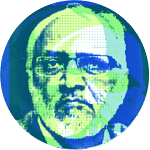 Ashok Gulati, 64
Ashok Gulati, 64
An agricultural economist, Gulati is former chairman of the Commission for Agricultural Costs and Prices. His choice is:
Shweta Saini, 37
Saini is an expert in Indian agricultural trade policy and food security, and is a senior consultant at Indian Council for Research on International Economic Relations.
“She has reasonably good work in the field. She is equipped to advise policymakers on agriculture and related issues,” Gulati said of her.
 Ashutosh Varshney, 61
Ashutosh Varshney, 61
A Sol Goldman Professor of political science and international and public affairs, Brown University, Varshney is considered an expert voice on ethnicity and nationalism, political economy of development and South Asian politics and political economy. His picks are:
Milan Vaishnav, 38
Vaishnav, director and senior fellow, South Asia Program, Carnegie Endowment for International Peace, is a doctorate from Columbia University. He is an expert voice on the political economy of India.
Varshney said he picked Vaishnav “for producing a most impressive book on criminals in politics, taking deep interest in public issues of Indian politics, and writing in an accessible manner”.
Sanjay Reddy, 48
Reddy, an associate professor of economics at The New School for Social Research, New York, is a doctorate from Harvard University. He is an expert in development economics, and a former member of the ‘Independent High-level Team of Advisers’ to the Economic and Social Council of the United Nations on the longer-term positioning of the UN Development System (in the context of the 2030 Agenda for Sustainable Development).
Varshney said he picked Reddy “for producing a whole array of economic insights, swimming against the disciplinary tide, and addressing issues of significance with penetrating ease”.
Sudhir Krishnaswamy, 43
Krishnaswamy teaches political philosophy and politics in India, law and governance, and legal system reform at Azim Premji University. He is an expert on Indian politics and constitutional law.
“A superb mind at the intersection of law and politics, I wish he would write more often, because when he does, the impact will be substantial,” Varshney said of him.
Vinay Sitapati, 34
Sitapati is assistant professor of political science and legal studies at Ashoka University. He is a doctorate from Princeton University, and wrote a bestselling biography of former prime minister P.V. Narasimha Rao in 2016.
Varshney said he picked him “for using his training in law and political theory for examining forgotten personalities and popular political trends, and for courageously defying disciplinary orthodoxies”.
Madhav Khosla, 33
Khosla was the inaugural B.R. Ambedkar Academic Fellow at Columbia Law School in 2016-17. He completed his doctorate from Harvard University, where his dissertation was awarded the Edward M. Chase Prize for “the best dissertation on a subject relating to the promotion of world peace”. He is one of the editors of The Oxford Handbook of the Indian Constitution.
Khosla has impressed Varshney with his “superb legal-philosophical mind, whose work will make a difference to how we think”.
Karthik Muralidharan, 43
Muralidharan, professor of economics at the University of California, San Diego, is a doctorate from Harvard University. His research focuses on health and education in developing countries.
Varshney said of him: “His work is very technically economic, so in the larger public sphere, his presence is limited, unlike the economics profession, where he towers in his cohort. He has started writing a book for the larger audiences on India’s economy. We might know more soon.”
 Bibek Debroy, 63
Bibek Debroy, 63
Chairman of the Economic Advisory Council to the Prime Minister, Debroy is a distinguished economist. Also a member of NITI Aayog, Debroy has authored several books and was awarded the Padma Shri, India’s fourth-highest civilian honour, in 2015. His picks are:
Karthik Muralidharan, 43
Muralidharan makes his second appearance on the list. As mentioned earlier, he is an academic and expert on health and education in developing countries.
Abhijit Vinayak Banerjee, 57
Banerjee, the Ford Foundation International Professor of Economics at Massachusetts Institute of Technology, holds a doctorate from Harvard. He is the author of five books and several journal articles. He was also a member of the Advanced Market Commitment Working Group at the Center for Global Development, a non-profit think tank based in Washington.
Sanjeev Sanyal, 48
Sanyal, currently principal adviser in the ministry of finance, was a Rhodes Scholar and an Eisenhower Fellow. He has decades of experience in the financial sector, and served as global strategist & managing director at Deutsche Bank until 2015.
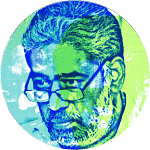 C. Raja Mohan, 65
C. Raja Mohan, 65
Director of the Institute of South Asian Studies at the National University of Singapore, Raja Mohan is an expert on strategic affairs. His picks are:
Ananth Padmanabhan, 35
Padmanabhan is a fellow at Centre for Policy Research (CPR), New Delhi. He is pursuing his doctorate from the University of Pennsylvania.
“He has done insightful work at the intersection of technology, society and regulatory policies. His research on the regulation of drones, modern biotechnology, Aadhaar and, more broadly, data governance makes him a powerful voice in the policy debates ahead,” said Raja Mohan.
Arunabha Ghosh, 40
Ghosh is CEO of the Council on Energy, Environment and Water, New Delhi. He pioneered and is a founding board member of the Clean Energy Access Network (CLEAN).
Raja Mohan has picked him “for his contributions to the Indian debates on energy and the environment”. “Ghosh has brought deep technical knowledge and a lot of common sense to India’s ideologically-charged debates on climate change and resource use,” he said.
Rahul Sagar, 36
Sagar is Global Network Associate Professor of political science at NYU, Abu Dhabi. Raja Mohan is impressed with “his pioneering work on putting together modern India’s thinking on world affairs over the last two centuries”.
“His forthcoming volumes provide the missing historical context to Delhi’s terribly partisan debates on contemporary foreign policy and reveal the multiple strands in the evolution of India’s world view,” Raja Mohan said.
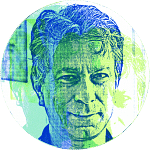 Dipankar Gupta, 69
Dipankar Gupta, 69
A public intellectual & columnist, Gupta taught sociology at Jawaharlal Nehru University in Delhi for about three decades. He is an expert on caste, ethnicity, labour laws and rural-urban studies. His picks are:
Sreedeep Bhattacharya, 35
Bhattacharya, a fellow at the Department of Centre for Public Affairs and Critical Theory, Shiv Nadar University, is a doctorate from JNU. His body of work explores the areas transforming urban spaces, consumer culture and advertising, auto-voyeuristic tendencies, hyper-visibilities and new ways of seeing.
“He has done some excellent work in visual sociology and on consumer culture that opens up this field of study, and demonstrates the links between the sociology of consumption and waste in India and the Western world,” Gupta said.
Naman Ahuja, 42
Ahuja, professor at the School of Arts and Aesthetics, JNU, is an expert in ancient and modern Indian art history. He has been teaching at JNU since 2006.
“He has done significant work on aesthetics as well as in the understanding of art forms the world over. He is a renowned expert on art appreciation and has curated museum shows across the world,” Gupta said.
Sundar Sarukkai, 52
Sarukkai, professor of philosophy at the National Institute of Advanced Studies, Bengaluru, is a doctorate in theoretical physics from Purdue University. He has been teaching at NIAS since 2016. He is an expert voice on the interface of science, philosophy and religion.
“He is a trained physicist and philosopher who has contributed significantly to the philosophy of science, and has advanced our understanding of political lives as experienced on an everyday basis. He has also contributed to Dalit studies,” Gupta said.
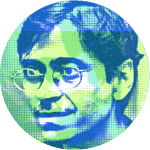 Makarand R. Paranjape, 58
Makarand R. Paranjape, 58
Director of the Indian Institute of Advanced Study in Shimla, Paranjape has over 35 years of teaching experience. He was also chairperson of the Centre for English Studies, Jawaharlal Nehru University, for two terms. Paranjape has authored numerous books in the field of literary criticism, poetry and fiction. His picks are:
Anirban Ganguly, 42
Ganguly, director of the Dr Syama Prasad Mookerjee Research Foundation (SPMRF), is a member of the policy research team of the Bharatiya Janata Party. A scholar of civilisation, history, politics and culture, he has authored various books, including The Modi Doctrine: New Paradigms in India’s Foreign Policy (2016).
Vikram Sampath, 38
Sampath, a Bengaluru-based historian, is a prolific writer. He received the Sahitya Akademi’s first Yuva Puraskar in English literature in 2012, and the ARSC International Award for Excellence in Historical Research in New York in 2011 for his book on Gauhar Jaan.
In 2015, he was one of the four artists and writers selected by President Pranab Mukherjee to be ‘writer-in-residence’ at the Rashtrapati Bhavan.
Hindol Sengupta, 39
Sengupta is editor-at-large, Fortune India. A journalist by profession, he is the author of many notable books, the latest being The Man Who Saved India: Sardar Patel and His Idea of India.
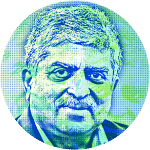 Nandan Nilekani, 63
Nandan Nilekani, 63
One of the founders of Infosys and the former chairman of UIDAI, the body set up to create and run the Aadhaar project, Nilekani is a venture capitalist. His picks are:
Nitin Pai, 42
Pai is the co-founder and director of Takshashila Institution, Bengaluru. He has worked for more than a decade in the Singapore government in strategic technology, broadband infrastructure and deregulation.
Nilekani said he picked Pai “for coming back from Singapore, giving up a comfortable job to create and lead a next-generation think tank for India, and training a whole generation of policy professionals”.
Aromar Revi, 57
Revi, founding director of the Indian Institute of Human Settlements (IIHS), is a global authority on urban issues. He is one of the most cited urban scholars in the world across multiple fields, with over 75 publications and 8,000 citations in fields like urbanisation, climate adaptation, infrastructure, sustainable development, and public policy.
Nilekani said he picked Revi “for leading India’s first university aspirant focusing on sustainable urbanisation and being a global voice on climate change”.
Arghya Sengupta, 33
Sengupta is co-founder and research director at the Vidhi Centre for Legal Policy. An expert in constitutional law and legal policy, he graduated from the National Law School of India University (NLSIU) in 2008 with a gold medal. A Rhodes Scholar at Oxford, he also taught for two years as a lecturer in administrative law at Pembroke College, Cambridge.
Nilekani picked Sengupta “for setting up a first-class policy think-tank for law, and for playing a seminal role in many of the recent laws and initiatives like Aadhaar, data privacy etc.”
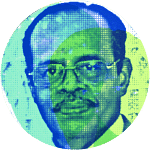 N.R. Madhava Menon, 83
N.R. Madhava Menon, 83
An ace legal educator and researcher, Menon is dubbed as the ‘father of modern legal education’ in India. His picks are:
Purvi Pokhriyal, 42
Pokhriyal is director and dean at the Institute of Law, Nirma University, Ahmedabad. Her research areas include India’s judicial processes, family jurisprudence, constitutional law, criminal law and alternative dispute resolution.
Arghya Sengupta, 33
Sengupta’s second appearance on this list is thanks to the large amount of legal research he has done, and the innovative ideas he has come up with, Menon said.
“A platform like Vidhi is a new development in the Indian legal spectrum. At a young age, he has managed to do a decent amount of good work,” the veteran legal mind said of Sengupta.
Sairam Bhat, 42
Bhat is a professor of law at NLSIU, and coordinator for the Centre for Environmental Law Education, Research and Advocacy and the Environmental Law Clinic.
“He is promising young man, especially in the field of business and commercial law,” Menon said.
Abhinav Chandrachud, 33
Chandrachud is an advocate at the Bombay High Court, and belongs to a distinguished legal family — his grandfather Yeshwant was the longest-serving Chief Justice of India, while dad Dhananjaya is a Supreme Court judge.
Abhinav has written extensively on freedom of speech, the judiciary, the Constitution of India and legal history.
“He is a highly qualified advocate and a good researcher,” said Menon.
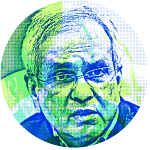 Rajiv Kumar, 67
Rajiv Kumar, 67
An economist, Kumar is currently the vice-chairperson of the government’s policy think-tank, NITI Aayog. His picks are:
Subhash Palekar, 69
Palekar, a Padma Shri awardee, is an agriculture scientist, who has been working on zero budget natural farming, where there are no input costs. “Going ahead, this will be one of the most critical areas in India,” said Kumar.
Abhay Bang, 68
Bang is the founder of SEARCH — Society for Education, Action and Research in Community Health. A Padma Shri awardee, he has made an enormous contribution in the field of healthcare, especially for the poor. He is the recipient of the distinguished alumni award from the Department of International Health at the Johns Hopkins Bloomberg School of Public Health.
 Ramachandra Guha, 60
Ramachandra Guha, 60
One of India’s best-known historians, Guha has authored many popular books such as India After Gandhi, Gandhi Before India and Makers of Modern India. His latest is Gandhi: The Years That Changed the World. His picks are:
Madhav Khosla, 33
Khosla’s second appearance on the list is tribute to his impressive CV. As mentioned earlier, he was the inaugural B.R. Ambedkar Academic Fellow at Columbia Law School in 2016-17, and is one of the editors of The Oxford Handbook of the Indian Constitution.
Vinay Sitapati, 34
Also a second appearance for Sitapati, assistant professor of political science and legal studies at the Sonepat-based Ashoka University and author of a bestselling biography of former prime minister P.V. Narasimha Rao.
Srinath Raghavan, 41
Raghavan, an expert on the military and strategic aspects of South Asia, is senior fellow at the Centre for Policy Research (CPR). He has authored many best-selling books, such as The Most Dangerous Place: A History of the United States in South Asia, India’s War: The Making of Modern South Asia 1939-1945, and War and Peace in Modern India.
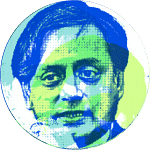 Shashi Tharoor, 62
Shashi Tharoor, 62
A Member of Parliament and former union minister, Tharoor has also served at the United Nations as Under Secretary General. He has authored many bestselling books, the latest being The Paradoxical Prime Minister. His picks are:
Gurmehar Kaur, 22
Kaur is a student activist and author of Small Acts of Freedom. She studied English literature at Lady Shri Ram College for Women, Delhi University. She is also an ambassador for Postcards for Peace, a UK-based charitable organisation that helps eliminate any form of discrimination.
Tharoor said of her: “Gurmehar is a woman with a distinctive voice, someone who has the courage to express her convictions even in the face of challenging circumstances, as well as the charm to deliver a compelling argument. India’s social fabric needs more of what Gurmehar has to offer.”
Manu S. Pillai, 28
Pillai is the author of award-winning books The Ivory Throne: Chronicles of the House of Travancore, and Rebel Sultans: The Deccan from Khilji to Shivaji. He has served as Tharoor’s former chief of staff, and has worked at Britain’s House of Lords with Lord Bilimoria. He has also assisted the BBC with its history series Incarnations.
“Manu is a brilliant historian and an evocative writer who has rekindled many a reader’s love for, and fascination with, unusual historical tales. His masterful non-fiction books, The Ivory Throne (2015) and Rebel Sultans (2018), and his weekly column with Mint Lounge reflect how Manu’s impeccably-researched and wonderfully-written stories continue to whet the average amateur historian’s appetite,” Tharoor said.
Piyush Tewari, 38
Tewari is founder and CEO of SaveLIFE Foundation, a non-profit organisation committed to improving road safety and emergency medical care in India. SLF is closely associated with Michael Bloomberg, the former mayor of New York City.
“Piyush Tewari’s SaveLIFE Foundation is a shining example of how an effective, mission-driven, non-profit, non-governmental organisation can create tangible and sustainable impact on our daily lives,” Tharoor said.
“His work, particularly on raising awareness of road safety issues and building broad political support for national road safety legislation, as well as in ushering in a Good Samaritan law, will continue to have a profound impact on our society for years to come.”
 Shiv Visvanathan, 68
Shiv Visvanathan, 68
Professor at O.P. Jindal Global University, Haryana, Visvanathan is a renowned public intellectual. He pioneered the concept of cognitive justice. His picks are:
Amit Bindal, 38
Bindal is an assistant professor and assistant director, Centre for Penology, Criminal Justice and Police Studies, Jindal Global Law School. An expert in criminal law, he was one of the editors-in-chief of the Jindal Global Law Review (JGLR) (Volume 3, Issue 1, September 2011).
“He works on the psychoanalysis of law. His attempts to look at the relation between law and myths has fascinating possibilities for future research,” Visvanathan said.
Misria Ali, 26
Ali is a researcher at the Centre for the Study of Knowledge Systems, OP Jindal Global University. Visvanathan said he picked her because “her work is on people’s perception on security and energy in Kodaikanal. She was one of the first to attempt to rethink STF studies in India, especially the relationship between science and democracy”.
Anumeha Yadav, 35
Yadav is an independent journalist and researcher, working on tribals and social movements. Visvanathan said her reports “have revealed her social sensitivity and courage, which makes her one of the best media analysts”.
 Srinath Raghavan, 41
Srinath Raghavan, 41
The only one to appear on the list of tomorrow’s intellectuals as well as today’s, Raghavan has picked two young scholars, working in his areas of interest (international relations and contemporary history), whose work is “stamped by originality and promise”. “Both have published their first books this year, but have already made a mark in their fields,” Raghavan said. His picks are:
Rohit De, 31
De, lawyer and historian of modern South Asia, focuses on the legal history of the Indian subcontinent and the common law world. He is an assistant professor in the department of history, Yale University. “Prof. De’s book, A People’s Constitution, is a remarkable account of the Indian Constitution’s impact on peoples’ lives and imagination. His historical work speaks directly to our times,” Raghavan said.
Zorawar Daulet Singh, 40
Singh, an author and foreign affairs analyst, is a fellow at the Centre for Policy Research. “Dr Singh’s work, Power and Diplomacy, is an important revisionist history of Indian foreign policy during the Cold War, with much relevance to contemporary policy debates,” Raghavan said.
 Surjit Bhalla, 70
Surjit Bhalla, 70
An economist, Bhalla is a former member of the Economic Advisory Council to the Prime Minister, set up by Narendra Modi. His picks are:
Yamini Aiyar, 42
Aiyar is president and chief executive, CPR, New Delhi. She is an expert on social policy and development, and founded the Accountability Initiative at CPR.
Bhalla said of her: “She has made significant contributions in the area of social policy, for example social expenditures on education. Governance has emerged as a key policy issue in emerging economies, and Yamini is expected to be at the forefront of this discussion.”
Shamika Ravi, 39
Ravi is director of research at Brookings India. She is an expert in game theory and microfinance, and is a member of the Economic Advisory Council to the Prime Minister.
“She has emerged as a major voice on gender, health, and democracy. She is likely to emerge as a key data-based academic policy player in India,” Bhalla said.
Hindol Sengupta, 39
Bhalla has also picked journalist-author Sengupta, and said of him: “He has emerged as a major political historian. His recent book on Sardar Patel is timely and a reminder that major historians in India need not be Left-of-centre.”
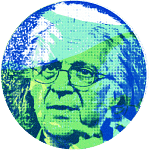 Upendra Baxi, 80
Upendra Baxi, 80
A legal scholar, Baxi has served as vice-chancellor of Delhi University. He has picked bright minds from fields such as law and sociology, over a wide age range. “Not of all them have been directly mentored by me. Some are my students, some are colleagues, and some are people whose work I have followed,” he said. His picks are:
Pratap Bhanu Mehta, 51
Mehta, now vice-chancellor of the Ashoka University, was president of CPR. He also taught political theory at Harvard and at Delhi’s Jawaharlal Nehru University.
Baxi explains his choice by saying: “He’s well-established by now, but will remain young for me. He takes a keen interest in jurisprudence and has written well on the subject.”
Navroz Dubash, 51, & Lavanya Rajamani, 45
Dubash is a professor at CPR, and coordinator of the Initiative on Climate, Energy, and Environment.
Rajamani is also a professor at CPR, where she researches legal issues related to the environment, in particular climate change, and international law.
“Both are making a mark with their research in the field of climate change and global warming. Their work on environmental law is also commendable,” Baxi said.
Amita Dhanda, 56
Dhanda is professor of law at NALSAR University of Law, Hyderabad. She is a Ph.D. from Delhi University, and her research has centred around questions of inclusion and exclusion.
Kalpana Kannabiran, 57
Kannabiran is a sociologist and lawyer, who is currently director of the Council for Social Development, Hyderabad. Her research areas include nuances of feminism and sociology. She is also an activist.
Gautam Bhatia, 29
Bhatia is an advocate, and a Rhodes Scholar. He acted as the second chair to Arvind Datar while arguing for the Right to Privacy in the Supreme Court.
“He is a practising lawyer, but if you read his work, he writes like an academic,” Baxi said.
Krishan Mahajan
Mahajan is a veteran journalist, who has worked with The Indian Express and The Hindustan Times, and is a senior professor of law. He is dean at K.R. Mangalam University, Haryana.
“Mahajan is a pioneer of legal journalism in this country. He has made a conscious choice to be a journalist. His column on legal perspectives is always very interesting,” Baxi said.
Menaka Guruswamy, 44
Guruswamy is a lawyer practising at the Supreme Court, as well as B.R. Ambedkar Research Scholar & Lecturer, Columbia Law School.
“Her work on LGBTQ rights and constitutional law deserves a mention,” Baxi said.
 Vijay Kelkar, 76
Vijay Kelkar, 76
A former finance secretary to the government of India, Kelkar also served as chairman of the Finance Commission and was awarded the country’s second highest civilian honour, the Padma Vibhushan, in 2011. His picks are:
Ajay Shah, 52
Shah is professor at the National Institute of Public Finance and Policy. His research interests include policy issues on Indian economic growth, open economy macroeconomics, public finance, financial economics and pensions.
Kelkar has picked him “for his work on the open economy and the financial sector”.
Abhay Pethe, 58
Pethe is professor, Dr Vibhooti Shukla Chair Unit in Urban Economics and Regional Development, University of Mumbai.
Kelkar has chosen him “for his work on urban sector and finances, land markets and municipal finances”.
Susan Thomas, 51
Thomas is a faculty member at the Indira Gandhi Institute of Development and Research, Mumbai. She studied civil engineering at IIT-Bombay and completed her PhD from the University of Southern California.
“Her work in microeconomics, on firm failures and stock exchanges” is the reason Kelkar has made her part of this list.
Editor’s note: ThePrint got in touch with at least half-a-dozen women intellectuals for their list of nominees but all of them did not want to participate in the exercise for varying reasons. While it is disappointing, ThePrint respects their decision.
(Reported and compiled by Jyoti Malhotra, Deeksha Bhardwaj, Remya Nair, Achyut Mishra, Rajgopal Singh and Mahua Venkatesh.)
Disclosure: Nandan Nilekani, the former chairman of UIDAI and co-founder of Infosys, is among the distinguished founder-investors of ThePrint. Please click here for details on investors.


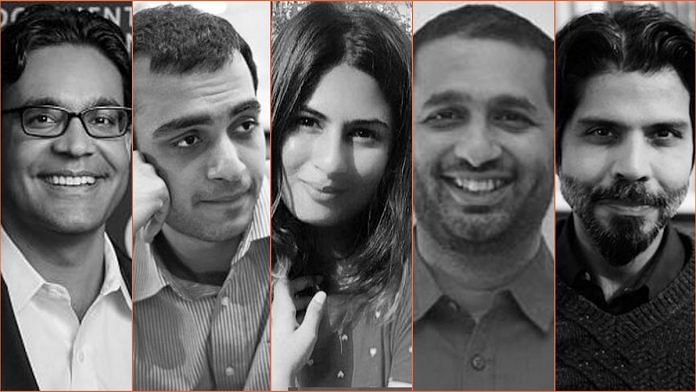

Intellectual: “I am an elite. I command, control, preach, make rules.”
Common man: “I don’t want any of that. I am a free man.”
Intellectual: “Yes, you are free because I told you so. Read Terms & Conditions.”
Accidentally Found this Article….
Enriching article on the one hand but Enquiring on the other hand as
– why did the Women Nominators did not participate?
– why the future too looks patriarchal with the list of influential intellectuals, which is a concern?
– why did the nominators did not look into more women practitioners?
– why/how the brain drain can be stopped..
– why there are missing intellectuals from medicine, agriculture, child care, women development, grassroot workers, …
*Not surprised that Bangalis matter.
** Not surprised that no one shows up from planning-architecture.
आप के हिसाब से ये लोग intellactual हैं तो फिर चूतियों की परिभाषा ही बदल दिए ।फेक डेटा के नाम पर गाय लिंचिंग पर पोस्ट लिखते हैं और फिर उसको डिलीट कर देते हैं बोलते हैं डेटा गलत था । दुनिया में सबसे ज्यादा हेट तो the print फैलता हैं ।
There is a fundamental difference between the common man’s notion of an intellectual and an English speaking Americo-Anglo manic elite’s notion of intellectual. Many on the list fall on the second category.
Interesting exercise. Notice the preponderance of Bengalies. Proof that what a Bengali thinks today, India will think tomorrow. Right or wrong I believe that as a community, they are intellectually, culturally and artistically superior to the rest of us.
Half of these people are outside India . . . ! LOL
Apart from the lack of diversity, this list is fraught with conflict of interest since most of the pickers have picked people close to him (unfortunately, not her here!).
Since this exercise contributes to social capital building for those who are nominated, conflict of interest is not an issue that could not be brushed under the carpet. Through a heavily internalised network system based on caste, we Indians are trained to gloss our eyes over the conflict of interest issues, which sits right at the center of sustaining caste system.
More so it is important, since this is a list of next gen intellectuals, and not ‘my favourite people in whom I see promise’, ThePrint should have addressed this to save their reputation as a representative of responsible journalism. Also I may add that it was horrifying to see that many distinguished journalists are involved with this exercise. We expect and deserve more!
It is no accident that most women intellectuals chose to decline your request. We’ll have to look them as intellectuals first and woman intellectuals next before extending our superficial helping hand of ‘representation’ to these high achievers who happened to carry an extra pair of X chromosome against the ‘y’ that the distinguished intellectuals who feature here.
Surprisingly you excluded Prof Sukanto Chowdhury and
Prof Supriya Chowdhury
The Print version of the next generation of Intellectuals:
1. Should be a Savarna.
2. Should have a foreign degree(except a few).
3. Should be an English-speaking person who writes exclusively in English, with no writing record in Indian languages.
4. Should be an elite.
Could you please explain what do you mean by “intellectual” and “next generation”? Some, if not most, of the so-called “intellectuals”, are above 50, including Tharoor and Guha, the most happening public figures among all who are on the list.
Last but not least, if someone like Vikarma Sampath could be called as an “intellectual”, one can understand what does that actually mean. LOL.
Well articulated sir.
Gurmehar Kaur also!! What kind of an intellectual she is?
One of the important name is missing in this list. According Historian Mr. Ramchandra Guha he is a brilliant bilingual Journalist . With out that name the list can’t be completed. The eminent Delhi based journalist, editor, environmentalists, author Mr. Sopan Joshi . His book ” Jal Thal Mal ” is the most significant book in our era about environment related with our water, excreta disposal which is effecting now and will effect our future. His Another two important books for the children about Mahatma Gandhi where it is depicted why Mahatma Gandhi was a down to earth social person rather than a political person. Mr. Joshi is a social activities and having keen knowledge of water bodies and working long time in this area.
The Print must know that there are many intellectuals in Hindi belt of India. They are Hindi speakers and have the potential of shaping future of India.
name the list can’t be completed. The eminent Delhi based journalist, editor, environmentalists, author Mr. Sopan Joshi . His book ” Jal Thal Mal ” is the most significant book in our era about environment related with our water, excreta disposal which is effecting now and will effect our future. His Another two important books for the children about Mahatma Gandhi where it is depicted why Mahatma Gandhi was a down to earth social person rather than a political person. Mr. Joshi is a social activities and having keen knowledge of water bodies and working long time in this area.
Interesting that almost all who were asked were men. Where are the women? No women intellectuals in India?
1) What is the purpose of such a list? (a) Is it to tell people what kind of people they should read? Or (b) is it to tell people what kind of justifications, opinions, ideas should influence their thought and cognition about intellectual life?
If it is about (a) then all the arguments about the lack of diversity/sheer exclusion in this list, as well as its nominees, holds. As do questions about whether it is people rather than institutions/experiences that shape our norms, concepts, categories and preferences.
If it is (b) then this list should have consisted of the ideas, norms, categories, domains or disciplines that these persons supposedly shape for an Indian public or the intellectual domain which engages with India (especially given the international location of most Indians on this list). While we, as readers, are given some idea about the domain of the work of these intellectuals, this list doesn’t tell us about the significance of their contribution to these particular domains.
There are many fascinating intellectuals on this list. Some of the people listed here have made very serious contributions to the domains of political, economic and legal thought in particular, but also to a range of other conversations. However, why should a public, or an interested group of people find this list legitimate, given all its exclusions, both representative and ideological? What are the justifications for creating a list of intellectuals in the first place?
For Print
As Raghu has stated that if these are the intellectuals, God save this country. Having taught nearly nine thousand students each taking equivalent of 3 Credit Courses over a period of 35 years first as a officer teacher at the Indian Military Academy and then at the PUNE University for 29 years on diverse areas, I can say that I have seen and interacted with most in this list which is impressive but certainly not the most authentic one. I am not very sympathetic to INDIA observers from abroad as they are only technically qualified but not necessarily culturally and civilizationally endowed. My comments harsh as they are will not gain me any new friends in amongst the gowns nor do I consider myself as a public intellectual per se. There are glaring non recognition in the areas of Sociology, Anthropology, Linguistics, Mathemetical Sciences, Bio technology, Bio informatics and even Law and Services.
However, having said the above I am all in for producing such a list which has never been done before. Suffice to say it has the same shortcoming as the Penselvania based group which does a world ranking of think tanks around the world. The definition of being a public intellectual needs to be clear. I remember an amusing incident when Rajiv Gandhi Visiting Harvard University wanted to meet the intellectuals and industrialists. The Americans were confused as they stated there are no intellectuals or industrialists in the US. There were academics, scientists and businessmen they informed!! However once again I consider the lutyen Delhi team to be imaginative as well as inovative to create this list as it can be used by any ruling government suffering from serious intellectual deficit. Congratulations to their initial efforts.
Professor Gautam Sen
Adjunct Professor NIAS
Distiinguished Visiting Fellow CLAWS
Subroto Mukherjee Chair of Excellence USI
Most of the mentors on the list are intellectually bankrupt and so we don’t know whether they will be able to pick intellectuals?
How about asking a bunch of great “doers” as to what they think are the future “doers” from the gen-next. India is hardly short of “intellectuals” especially those that are anointed by the press; so a list of “doers” and what they are doing should shed some useful light.
I don’t find any mention of Dr. MS Swaminathan, Agricultural Scientists, Dr. Vaidyanathan of IIM, Bangalore and Vandana Shiva. 80% of the names mentioned are close to Delhi Durbar. Don’t you have any home made and hom grown intellectuals? It is better to have a Delhi Zip Code instead of one from Madurai.
How many of them are from SC/ST & other backward community?
dear editor/s
why are there no dalits, women or other ‘minority’ intellectuals among the nominators?
sincerely
sushrut jadhav
if these are intellectuals, god save india. stop glorifying these armchair do-nothing’s. highlight doers, people who positively transform their environ, people who generate employment…We have a surfiet of thinkers from time immemorial, we can well do without them. their ideas wont help tie a shoe-lace.
You have missed prof Arun phadke.
Just the Sirname of the intellectual(s) were kool… Hahaha…
Hyporicy ki bhi seema hoti hai… Gupta/baniya ji.
Dear Jyoti and team,
I enjoyed reading this piece, it helped me get a broader view of thinkers and current thoughts in the country. Unfortunately, I spotted some challenges with the article I’d like to point out, in the interest of making ‘The Print’ a stronger medium. Most of the nominees are upper caste men, very few women. I understand you reached out to women intellectuals for their nominees but you may have missed out on other intersectionalities. The intellectuals you have sought nominations from are also people who are predominantly upper caste; many of them are older than 40/50 years, could not possibly be the next generation. The list is also heavy on intellectuals who are visible in Delhi and the northern part of the country. There are others who have nominated people from their own institute/organisation, which is merely a display of limitation of the pool itself and the fact that people may be using this medium for other purposes. Many intellectuals are influencing ideas across the country and deserve being on the list. This is not to say the current list of people should not be celebrated, but when we pick a biased version of the intelligencia and celebrate them, we fail to make the change we want to happen. Then we play into the status quo by failing to represent the diversity of voices. I have great respect for The Print and expect you to shoulder a greater responsibility of representing the diversity of discourse in India. I hope this feedback is valued. Thank you!
Intellectuals my ass
Many of these names are familiar because I have read their columns. Shri Mihir Sharma did a fine job editing the Op Ed page of Business Standard, exposing readers to a selection of knowledgeable people. It goes without saying that many of these talented young people would feel happy to offer their expertise, pro bono, to the government, to enrich policy making. India is dripping with talent.
Bharat is a Socialist country where all are equal. So no question of dividing people as intellectuals and intellectuals. Jai karl marxa.
List looks impressive. Few notes.
1. So many lawyers, but in India justice process is very inefficient. How these people can contribute quickly. Not over a period of next 50 yrs.
2. Very impressive is Zero Cost Farming, how this can be adopted through Govt Policy.
3. Lot of policy studying guys & writers are also in the list, but, contribution to the society upliftment is important than writing some well published books.
Well, its a MANEL of pickers! So by this token, there are no women intellectuals in this country that are good enough to “pick” next gen! And the gender profile of people who have been picked is appalling! Men, Men and More Men – the exception Upendra Baxi who has 4 women on his list of 6 or 7. And NO DIVERSITY on any other count! Where are the Muslims, Dalits, Transpersons, Kashmiris, the entire north eastern region, among the pickers or the picked?! This is a poor note to end the year on – totally status quoist – truly! Overwhelmingly Hindu savarna English educated, elite, metropolitan – so no. This is NOT a list of the possibilities India holds. By ANY definition completeky unrepresentative of the current and next gen.
And not a single representative of the left!
Valid points you have raised. Thank you.
In that way the ‘future intellectuals’ depends on the current intellectuals been contacted by the PRINT!
It’s hard to believe that I am not in the list
Hi, surprised that i am not surprised to find a baraat of men here. And the few women who are named are faceless. Is this the Indian answer to the male dominance of the dominant Western model?